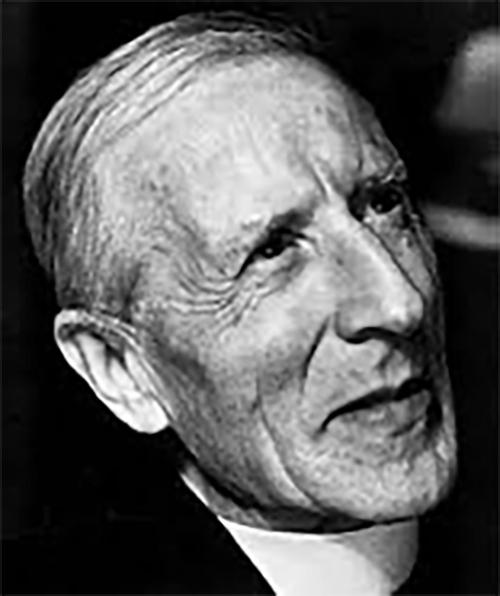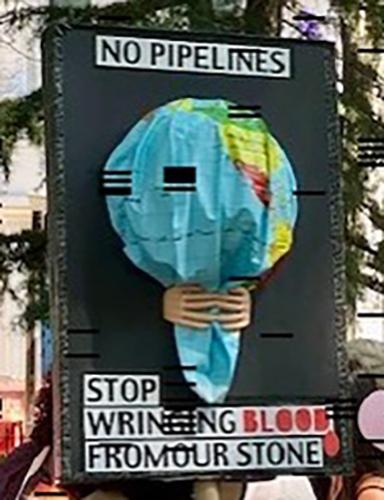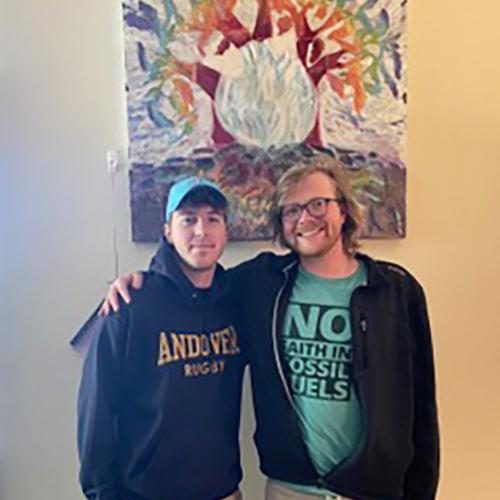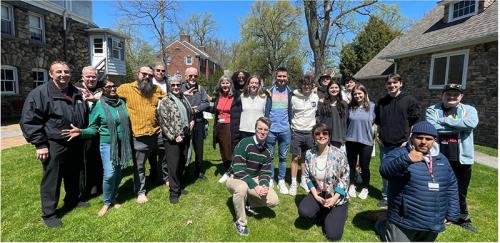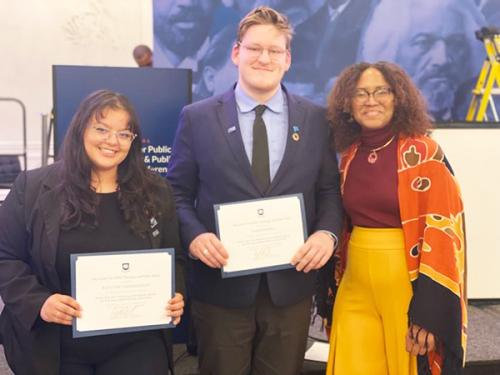Kathleen Deignan, CND Institute for Earth and Spirit: News & Events
Please visit often for the latest news and events pertaining to the Kathleen Deignan, CND Institute for Earth and Spirit.
News
2025 News & Events
Sr. Kathleen Deignan, Dr. Brian Brown and Br. Kevin Cawley joined 1,000+ participants on a rainy, cool, windy Saturday , April 5 in Mamaroneck, NY to demonstrate their concern that the US Administration had overstepped its authority in eliminating multiple federal agencies charged with addressing important public needs. Our concern was particularly acute for the message of Pope Francis in Laudato si being ignored by the obvious contempt shown towards the science of climate change and its impact on those made poor. The Trump administration has frequently questioned climate science and said it will roll back major climate policies, including rules that target pollution from vehicles and power plants, in a major blow to America’s progress on clean air, clean water and climate action. The Environmental Protection Agency announced it will undo rules that would have pushed power plants and carmakers toward cleaner forms of energy. It also intends to roll back rules on soot, mercury and coal ash pollution, as well as the so-called “good neighbor rule” that regulates downwind air pollution, and eliminate its programs overseeing environmental justice and diversity.
Significantly, Trump’s EPA is also preparing to reconsider and strike down a consequential scientific finding on the dangers of climate pollution that has served as the basis behind federal regulations to curb them. Dismissing the precedent would strip the EPA’s authority to manage the pollution that causes global warming. The effect of recent debilitating cuts in funding and in staffing at such agencies as Health and Human Services, the Federal Emergency Management Agency, the Environmental Protection Agency and the National Oceanic and Atmospheric Administration will be felt across the country and especially in many rural areas lacking alternative support due to lack of resources. (Photo credit : K. Cawley)
This local assembly of citizens was addressed by several government officials in county and town offices during a small clustering in Mamaroneck Town Harbor Park near the historic one-room schoolhouse. Traffic on the adjacent Post Road continued to flow and was punctuated by steady signs of support of blowing horns as cars moved past the demonstrators massed on the sidewalks on both sides of the road. The gathering dispersed peacefully as speakers completed their remarks. Multiple home-made signs brightened the assembly.
Reports from across the country later on revealed a wide and deep constituency of distressed citizens gathering in cities and towns of all sizes to challenge the federal administration on its policies and the direction of so many decisions that impacted the most vulnerable people and the most vulnerable places. Additional news reports on Sunday included reports on rallies in 1400 cities and towns including very large crowds of 100,000+ in Boston and Chicago through the afternoon. There were no reports of violence or arrests. Organizers plan further events in spring and summer
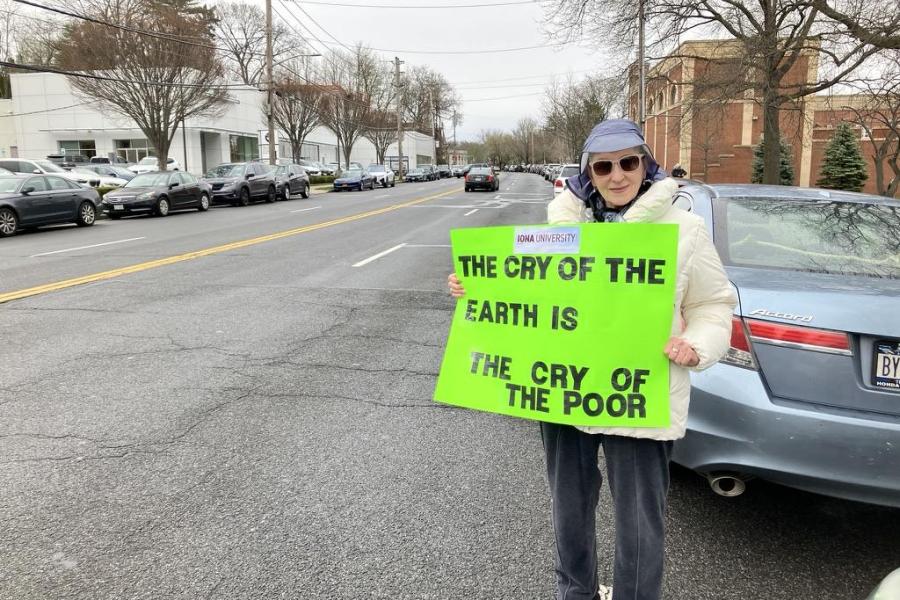
On March 25, 2025, Br. Kevin Cawley offered a 90-minute program online to St. Edmund’s College in Shillong, India as a presenter during a two-day conference on sustainability , environment and climate change.
Organizers had invited Kevin for his expertise on sustainability and climate change in the context of Laudato Si and his ongoing efforts at the United Nations to foster the Sustainable Development Goals. The conference announcement presents the broad contours of the two-day gathering: “MIT-World Peace University Pune Center of Excellence in Sustainability, Environment and Climate Change In Association with St. Edmund's College, Shillong Organizes Two Days Consultancy Workshop on Strengthening Environmental Leadership through Eco-Spirituality, Eco-Psychology, and Governance.” The conference was part of a major research project supported by G.B.Pant National Institute of Himalayan Environment.
Background & Rationale: The research project "Ecology, Eco-Spirituality, and Eco-Psychology – A Study of Environmental Governance in the Selected Areas of the Himalayan Region," sanctioned by G.B. Pant National Institute of Himalayan Environment (GBPNIHE), aims to explore the systems, approaches, and practices of environmental governance while integrating eco-spirituality and eco-psychology in the Meghalaya State. The project seeks to examine the presence of eco-spirituality in religious texts, customs, rituals, and prayers, as well as the psychological dimensions influencing environmental governance and climate consciousness in the region.
This two-day workshop was designed as a critical intervention under the Action Research framework to:
- Study the systems, approaches, and practices of environmental governance in Meghalaya, particularly in the context of common property / natural resource management.
- Identify and analyze the presence of eco-spirituality and its effectiveness in traditional cultural practices & rituals, governance structures and community-led ecological conservation.
St. Edmund's College, Shillong, is a foundation of the Edmund Rice Christian Brothers who were invited to Shillong in 1915 and have administered the college since 1923 as a higher secondary school recognised by Cambridge University for examination up to Higher School Certificate level. The school currently enrolls 3,300 students in a co-educational setting.
Kevin’s program title was, Ecology, Environment, Global Governance, Spirituality and Psychology: Contemporary Issues and A Way Forward. The presentation worked with topics leading from three main concerns: climate change, biodiversity loss and global pollution. The material included references to UN climate change conferences, the global carbon budget, recent catastrophic heat waves, rising sea levels, global financial challenges, recent biodiversity conferences, stalled negotiations for the UN Plastics Treaty, presentations at the International Court of Justice on obligations of states to the global climate system and multiple global financial problems to be adjudicated. The efforts of Pope Francis in Laudato si and his recent pronouncements to turn attention to the plight of the poor during this Jubilee Year received emphasis, especially regarding the injustices linked to the global debt crisis for multiple countries. The presentation concluded with encouragement to step up to the challenge of restoring the environment by linking with others and especially linking to faith-based programs addressing Care of Earth where you are. That is where you will be most effective. Remember always that progress will come only if we remember as Thomas Berry has noted, that not just the human, but the entire life system of the planet must progress as well.
2024 News & Events
Thomas Berry Forum for Ecological Dialogue
Berry Contemplative Ecologists Circle
December 19, 2024
Evening Thoughts Chapter 11: Catching the Power of the Wind
Reflection: Tom Roepke
This Chapter is adapted from an address by Thomas Berry on the Occasion of the Thirtieth Anniversary of the United Nations at the Spiritual Summit Conference, October 24, 1975. Thomas shares his regard for the United Nations, “ this space outside of all nations”, and its responsibility for the whole human community. He agrees that the work should not be measured by utopian standards if we are to be fair to the complexities of human affairs at this level. The challenge is to turn our perils into opportunities for shaping community.
Tom Roepke notes that in 1945 at founding of the UN, the planet held only 2.5 billion people and the UN had 51 members. We know a better consciousness is now needed to support the population of 8 billion. The resurgence of meaning needs to grow along with the human actions to save the planet. We are reminded that 59% of all species live in the soil. We need to open the work to the inner resources of the numinous. We are now invited to participate in the Great Turning (Joanna Macy): the numinous works through the human; present crisis is a numinous moment; each nation must discover its place and purpose; to love the Earth is a new way of being human. We can say yes, we are in turmoil, but not despair. The great danger is the loss of internal vitality- the will to carry out the intention. (19 Participants)
For this event, Kathleen led a prayer ritual using the prayers from "Teilhard de Chardin, A Book of Hours." Kathleen was the producer and co-editor of this work with Sr. Libby Osgood, CND. The book, “ traces the vein of hope-filled prayer running through the writings of Teilhard de Chardin” says John Haught. The Book of Hours is arranged under evolutionary themes divided into Eight days – with the Eighth, “Tomorrow”, honoring Teilhard’s vision of the future. Each day is subdivided into Dawn, Day, Dusk and Dark. Kathleen posits the book as a devotional companion for postmodern contemplatives. This breviary promises to ignite one’s innate sense of the universe as the revelatory and evolving body of divinity.
Sr. Kathleen hosted this event for the American Teilhard Association, "At Prayer in the Cosmos with Teilhard" on November 18, 2024. You can access the recording of this event here.
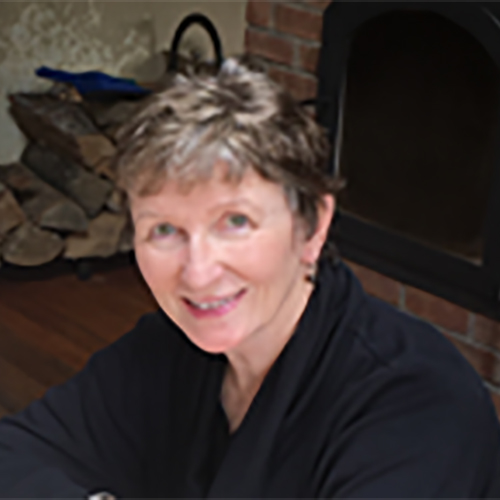
Sr. Kathleen Deignan Institute for Earth and Spirit Welcomes Leadership of Sisters of the Congregation of Notre Dame to Iona University
October 25, 2024
Friday, October 25th saw the delegation of Sisters welcomed to the Atrium reception area of the LaPenta School of Business accompanied by our traditional Iona welcome - the skirl of bagpipes. Our guests were led in procession to the spacious Dean’s Conference Room for the presentations and discussions that would fill the morning.
Several speakers offered in-person endorsements and congratulations: Rachana Umashankar, Religious Studies Chair &(who also presented a musical welcome on the harp), Dr. Brian Brown a co-founder of the Thomas Berry Forum for Ecological Dialogue and others.We had the pleasure to welcome the newest member of the Institute - Fr. Vaughn Fayle, OFM , where he is very busy teaching Music, Philosophy and Religious Studies.Dan Potoki, former student of Kathleen, spoke movingly of his time at Iona under the guidance of Kathleen (who introduced him to the woman he would marry); his time spent with the CIA and FBI combatting human trafficking; his links with the Hynes Institute and Columbia University and his conviction he is committed to works of Mercy in the world inspired by his family - his two youngest accompanied Dan - and his time at Iona. Student Connor Murray spoke briefly of his student perspective as he navigates his undergrad time here at Iona, as a founder of the Iona GreenFaith Circle,and his opportunity to travel this coming summer to Assisi for the annual Thomas Berry environment gathering.
Dr. James Robinson read aloud a powerful letter of endorsement for the work of the Institute from President Seamus Carey. Jim offered an overview of his perspective as he assumes his new responsibilities as Director of the Deignan Institute this semester. Dean Joseph Stabile of Arts and Sciences spoke of the contributions of the Institute to the mission of Iona across multiple decades, especially how essential these teachings are to the success of the Columba Cornerstone curriculum. We heard from student Layne McDonald and her connections with Sr. Kathleen at the Deignan Institute where she is assisting Sr. Kathleen with her soon to be published Book of Hours for Thomas Berry. Layne is on the Rowing Team and credits her family for her sense of the natural world. She is a Biology major and heard about the Institute during a presentation we made in Jim Robinson’s class on Religion and the Natural World.We also heard from several students who are part of the Food Recovery Network and the Iona GreenFaith Circle, newly formed. Marie Pace shared her enthusiasm for the work of Kathleen, having observed the movements over her 24 years at Iona. Dr. Elena Procario Foley, who holds the Endowed Chair in Jewish-Catholic Studies, recalled her alliance with Kathleen on Catholic identity efforts at Iona when they were colleagues at Religious Studies engagements on these issues. In the spirit of Marguerite Bourgeois and Edmund Rice, Elena notes that 30% of Iona students are Pell Grant recipients – they need significant financial aid to maintain their places at the University. Dr. Christina Carlson, also a product of CND education on Staten Island, made a point of highlighting the CND emphasis on the importance of education to foster the status of women. New faculty were represented by Dr. Sharon Williams by way of Drew University and now in the Iona department of Religious Studies who offered that her introduction to Kathleen came via their shared love of sacred music in the Psalms.Sharon has been bringing Iona students to Ghana, Jamaica and United Nations events.
The assembly moved to luncheon in the La Penta Atrium which included informal discussion with students.
The Afternoon continued with a series of video testimonials from former students and Iona colleagues all celebrating their connections to Kathleen and the Institute. Kathleen thanked her sister, Ann, for her regular and deep generosity toward the Institute, sponsoring multiple students with her financial assistance.Kathleen mentioned that Sr. Libby Osgood, CND, was indispensable to the completion of the very successful Teilhard de Chardin, A Book of Hours, (2023) Orbis Books.Brian Brown and Br. Kevin Cawley gave witness to their partnership as co-founders of the Thomas Berry Forum for Ecological Dialogue in the Institute. Kevin made remarks linking his work with Edmund Rice International at the United Nations in the work of care of Earth as an essential feature of fostering the ideals of Laudato si in that space. Kathleen reported on her links to Fr. Vaughn projects in Malawi when she offered a recent presentation online to 90+ seminarians.Dr. Christina Carlson noted here that she has joined with Edmund Rice Education Beyond Borders at their recent convening in India.
SR. Ona Bessette, CND Superior, thanked all for their commitment to the mission of the Institute and their faithfulness to the inspiration of Kathleen over four decades at Iona.Sr. Ona enthused over the efforts to expand the reach to be more mobile and available as was evident in the reports on works in Africa. The Sisters have communities in Cameroon, for example. Other collaborations might be forthcoming as religious open the potential of the teachings of Laudato si for the wider church.
The day concluded with several video testimonies selected from a wide array on offer. The concluding video from Chris O’Connor closed with his astonishing announcement that he would match any gift to come from the CND visitors up to one hundred thousand dollars.The 2 p.m. hour having arrived, the celebration then adjourned.
A few Photos from the Day (Kevin Cawley)
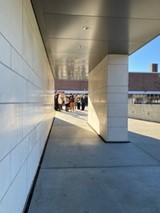
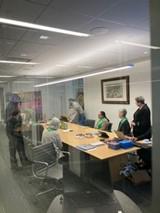
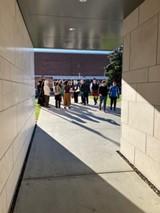
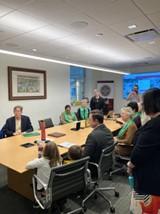
Deignan Institute Delegation Attends Oren Lyons Tribute on Indigenous Peoples Day
Sr. Kathleen Deignan, Dr James Robinson, and Br. Kevin Cawley represented Iona at the Thomas Berry Foundation, Center for Earth Ethics and Union Theological Seminary on October 14 for a special ceremony honoring Chief Oren Lyons with the 2024 Thomas Berry Award. The Thomas Berry Forum for Ecological Dialogue at Iona University received the Thomas Berry Award in 2019
Sr. Kathleen and Br. Kevin were joined by Dr. Brian Brown, Emeritus Professor of Religious Studies at Iona who received special recognition on the occasion of the publication of his latest book, Earth’s Journey into Hope: Reflections on Thomas Berry’s Great Work.
On Monday, October 14, Indigenous Peoples’ Day, the Thomas Berry Foundation honored Oren Lyons, a Faithkeeper of the Turtle Clan of the Onondaga Nation of the Haudenosaunee Confederacy, with the 2024 Thomas Berry Award. The ceremony, co-sponsored by Union Theological Seminary and the Center for Earth Ethics, was held in Union’s James Chapel
The Thomas Berry Foundation confers this award to individuals who have dedicated their lives to service to the Earth. The 25 recipients of this award, first presented in 1998, include acclaimed musicians, professors, spiritual leaders and leaders of international foundations.
Rev. Dr. Serene Jones, president of Union, welcomed everyone and thanked Chief Lyons for his “tireless and courageous work to advance justice for Indigenous communities and for the environment over the course of an incredible lifetime.” CEE Executive Director Karenna Gore honed in on Lyons’ significance for the Indigenous, environmental and climate justice movements. Remembering a prophetic speech that Lyons delivered more than 20 years ago (which he would later read in the program), she commended him for “speaking with such clarity…which reflects not only what an extraordinary person he is, but the depth of the tradition that he carries.”
John Grim and Mary Evelyn Tucker, representing the Foundation and the Yale Forum on Religion and Ecology, presented the award. Lyons had known Berry (1914-2009), a Catholic priest and ecology advocate, since the 1970s, when Lyons began speaking about environmental concerns and Indigenous values. In her remarks, Tucker remarked, “Their mutual appreciation was so great that Berry once said of Chief Lyons, ‘Oren Lyons was undoubtedly one of the persons who would come into my mind immediately as a model of what a human being might be.’”
The need to work for peace, equality and harmony among all people, and between people and the Earth animates Lyons. “Leaders of peace must step forward and take the responsibility for a terrible paradigm change in the direction of current lifestyles in Western and materialistic societies,” he said. “The human species has become the most voracious and abusive consumer of Earth’s resources. We have tipped a balance against the future of our children, and we have tipped the balance against the future of our species.” (Photo of Oren Lyons: Allegra Lovejoy)
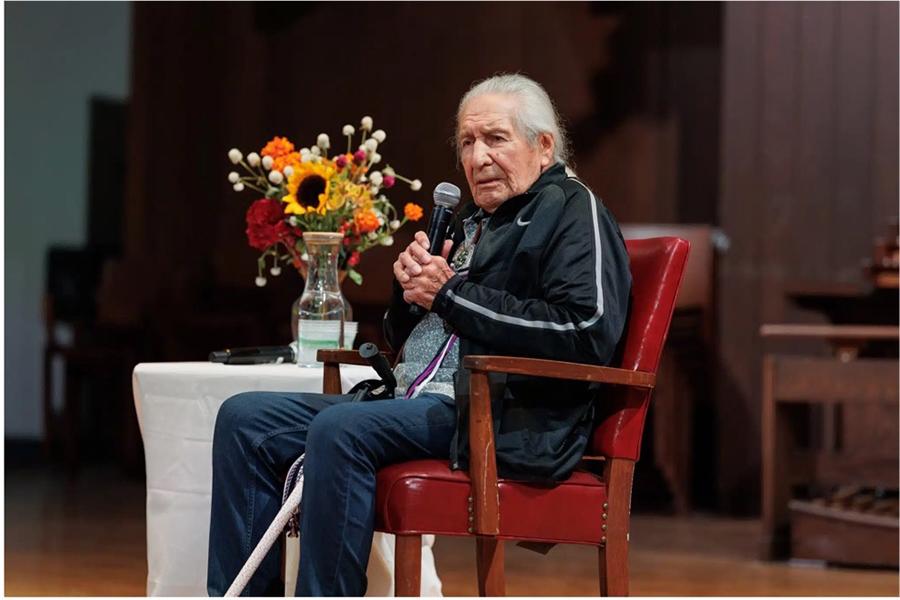
Chief Oren Lyons
Hope Amid Our Planetary Crisis: Is there still hope to avert a looming planetary crisis?
Facilitators: Br. Kevin Cawley, CFC and Sr. Kathleen Deignan, CND will share their ‘hope amid the planetary crisis’ based on science, Laudato Sí and the reflections of Thomas Berry.
Ninety-Minute Session hosted by Br. Tino D’Abreu, CFC, with 100+ participants online in 16 countries.
English Version
Spanish Version

Deignan Institute For Earth And Spirit Celebrates Season of Creation
Each year from September 1 to October 4, the Christian family unites for this worldwide celebration of prayer and action to protect our common home. It is a special season where we celebrate God as Creator and acknowledge Creation as the divine continuing act that summons us as collaborators to love and care for the gift of all that is created. The times we live in show that we are not relating to the Earth as a gift from our Creator, but rather too often as a resource to be used. And yet, there is hope and the expectation for a better future. To hope in a biblical context does not mean to stand still and quiet, but rather groaning, crying, and actively striving for new life amidst the struggles.
On October 1, At noon, a group of about 70 students assembled at the Ginkgo tree on the New Rochelle campus. They were greeted by the beautiful music of Dr. Rachana Umashankar’s harp. Fr. Gerard Mulvey offered the opening prayer. Reflections on St. Francis, Pope Francis, indigenous wisdom, eco-spirituality, GreenFaith, and the Ginkgo Tree were offered by Dr. Jim Robinson, Sr. Kathleen Deignan, Br. Kevin Cawley, Prof. Liam Myers, and Connor Murray. Br Kevin made note of the extraordinary specimen of Ginkgo that has been growing on this ground for nearly 250 years. Sr. Kathleen Deignan then offered a blessing of the animals for the pets of a number of students
Following these remarks and prayers, the assembly processed across North Avenue with the icon of St. Francis held aloft, to conclude the celebration with the planting of a tree in front of Murphy Center. Facilities workers , under the direction of Peter Heslin, had prepared the ground and maneuvered the root ball carefully for the planting. Multiple students then stepped forward to grab shovels and complete the work of planting the new addition, adding compost made from cafeteria food scraps. Our planting was a Ruby Falls weeping redbud. This small tree is native to N. America and will grace the gentle slope to the left of the Murphy Center entrance.
Thank you to all participants and thank you to the planners and those who contributed their expertise to a successful marking of how to carry forward our care for our common home. Deignan Institute for Earth and Spirit offers special thanks to the office of Facilities Management and Office of Mission and Ministry for their financial support.
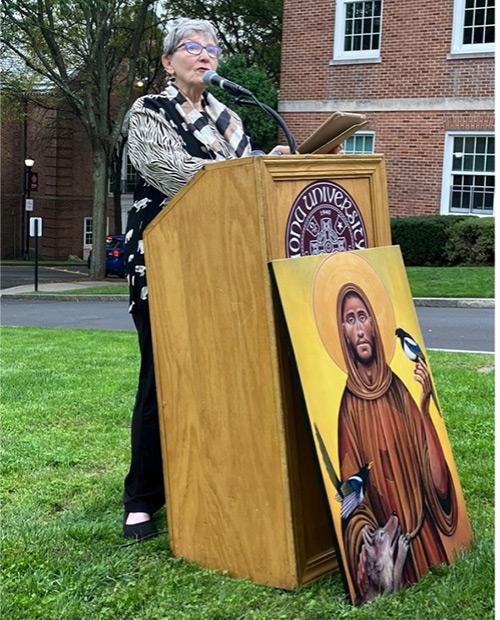
Sister Kathleen
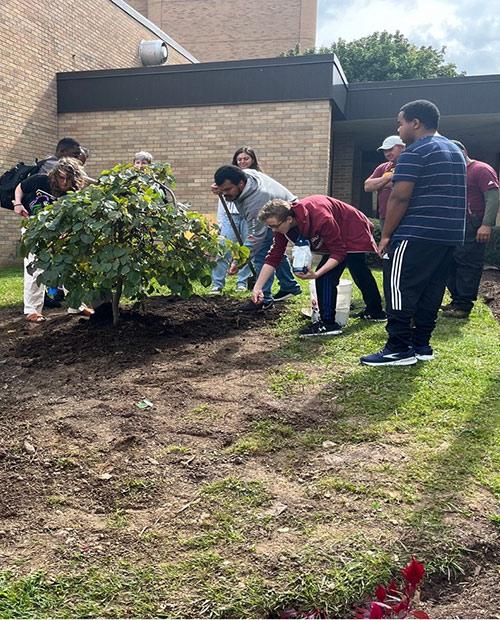
The planting of a tree in front of Murphy Center.
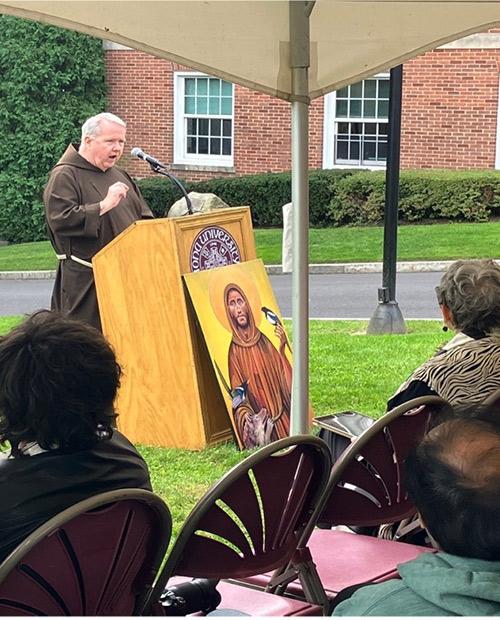
Father Mulvey
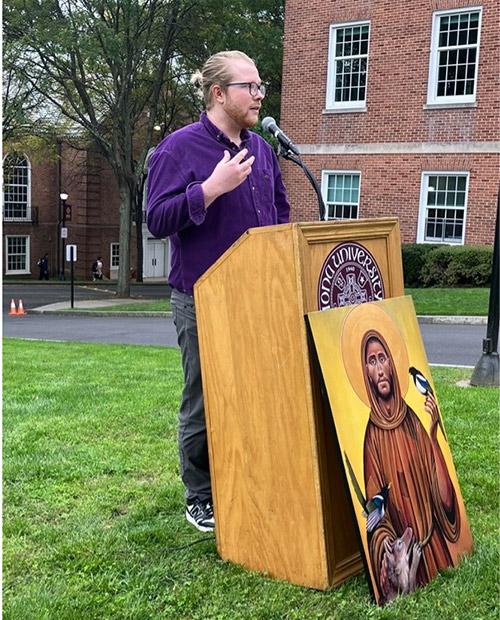
Professor Myers
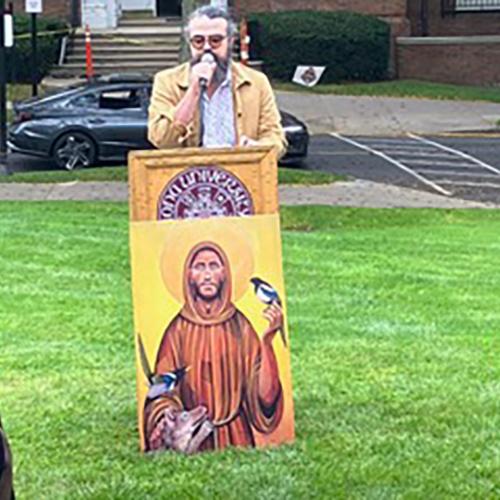
Jim Robinson, Ph.D.
Edmund Rice International and Deignan Institute at Iona University join climate march targeting Citibank
Citibank Primary Lender
On Sunday, August 25, a large contingent of several hundred climate activists joined a march in NYC to challenge the role of CitiBank, with Headquarters in New York City, as a primary lender to the fossil fuel industry. Sister Kathleen Deignan, CND, Founder of the Deignan Institute for Earth and Spirit was joined by Br. Kevin Cawley, Main Representative of ERI at United Nations in NY and Director of the Thomas Berry Forum for Ecological Dialogue. Summer of Heat marchers assembled in Washington Square at the site of the infamous Triangle Shirtwaist Factory Fire in 1911 which killed over 146 workers, mainly women and girls.Organizers note: "They died because of callous corporate greed and business owners who did not recognize their right to safe and dignified lives," the website explains. "Today, hundreds of thousands of people are dying from climate-induced fires, extreme heat, flooding, and air pollution. The cause is the same — corporate greed, racism, and a callous disregard for life. Just as the women of 1911 took the streets to change their conditions, we will march and fight like hell for the living." The climate crisis targets all but not all equally, - women and girls suffer the impacts of climate change dis-proportionality around the world.
Principles of Action
Summer of Heat brings together a multiracial, multi-generational, cross-class movement for a campaign of sustained nonviolent direct action that demands that Wall Street stop investing in, financing, and insuring fossil fuels. Our work together is guided by these principles:
- We are unwavering in our goal to end fossil fuels.
- We fight to protect people and places we love; we honor each other's fights.
- We fight to end all forms of oppression.
At the core of the social, economic, and environmental crises we face today are centuries of colonialism, racism, capitalism, and other systems of oppression. Our work is grounded in addressing the root causes of the climate crisis, and we remain vigilant to the ways these systems can creep into our work.
Line of March and Drum line
The line of march moved from Washington Square east to 6th Avenue and then downtown to eventually conclude at the Manhattan residence of Jane Fraser, CEO of Citibank. The action was part of Summer of Heat, a season-long series of civil disobedience targeting the funders of the climate crisis. Marchers were boosted by then joyful energy and percussive beat of over 50 members of the Brazilian Samba Reggae drum line Fogo Azul (Blue Fire).
Since last September at NYC’s March to End Fossil Fuels, the Iona community has committed itself with renewed vigor to the work of environmental justice. At the march, a group of us met leaders from GreenFaith, a grassroots organization committed to multifaith climate justice work. Since that encounter, students and professors with the Deignan Institute for Earth and Spirit have collaborated to form the Earth & Spirit GreenFaith Circle at Iona University.
This project builds on the historical collaboration between the Institute for Earth and Spirit and GreenFaith. Three members of the Institute, Br. Kevin Cawley, Sr. Kathleen Deignan, and Dr. Jim Robinson are GreenFaith Fellows. To further strengthen this relationship and deepen their spiritual grounding in the earth, Prof. Liam Myers and senior Connor Murray are participating in the GreenFaith Rising Leader Fellowship over this coming year, which began with a four-day retreat in Berkeley, CA.
Our time together began with co-creating an altar, wherein each fellow was asked to bring something sacred forward. As we brought our items to the altar, we shared about the faith traditions we practice and how they compel us to protect our mother earth.
This opening set the tone for the next few days which included time to get to know each other through storytelling, to build community through shared meals and conversation, and to learn together about the history of nonviolent resistance. We especially enjoyed the opportunity to visit Urban Adamah and learn about Judaism's deep connection to the earth and urban land stewardship.
We topped it all off with a “passion show.” Turns out, hidden amongst us were musicians, artists, comedians, public speakers, and even impressionists. The passion show was a reminder that, in our movement, everyone has an important role to play.
As we returned to our lives, we reflected on what we had experienced. Prof. Liam was reminded of the strength of community, while Connor learned to think of his challenges as blessings in disguise and opportunities to show strength and courage. We both walked away grateful for the retreat which prepared us for our work at home – at Iona.
Since our circle’s launch on Earth Day, we have already been up to great things! We have hosted a collaborative lecture with St. John’s University on the dangers of rising seas, built relationships with local partners such as VP Al Gore’s Climate Reality Leaders and the Catholic Worker, and are working towards the creation of a pollinator garden on campus this Fall. Throughout the coming months, we intend to pursue more exciting projects while simultaneously growing our community of eco-conscious students, faculty, and staff. If you have been experiencing climate anxiety and are looking for a high impact way to get involved, this is your call to action. You can reach Prof. Liam at wmyers@iona.edu to join the circle and learn more.
Although our retreat may be over and another school year is upon us, the work is far from finished. There is so much we have yet to accomplish, and we need your help. We’re counting on you to join in this movement to make our planet and our campus livable for future generations.
On Earth Day, April 22, 2024, Iona faculty, staff, and students gathered for the launch party of our recently formed Earth and Spirit GreenFaith Circle. Prof. Liam Myers introduced the event with a poem by Mary Oliver. Dr. Jim Robinson offered a contemplative exercise inviting those present to reflect our connection to the wider web of life, while considering our call to embody sustainability and justice. Sr. Kathleen Deignan reflected on the history and future of the Institute. Iona students Connor Murray, Layne McDonald, and Lazar Paroski offered reflections on their efforts to embody eco-justice at Iona and beyond.
Rev. Chelsea MacMillan of GreenFaith issued a call to action for climate justice, highlighting the oppression of GreenFaith activists in Tanzania who are suffering imprisonment for their opposition to the East Africa Crude Oil Pipeline (EACOP).
The GreenFaith Circle at Iona has been fostered by Professor Liam Myers, Student Engagement and Social Media Facilitator for the Deignan Institute. The Circle's student leaders are Layne McDonald, Connor Murray, and Lazar Paroski. This is the first GreenFaith Circle to be rooted in a university in the US!
Recently we learned that both Connor Murray and Professor Myers have been accepted to the GreenFaith Rising Leaders Fellowship which will take place over the course of the academic year, beginning with a retreat next month in California. Connor has been offered a full $1500 scholarship to participate! Deignan Institute is delighted and justly proud of these fresh links with this global Faith-based organization that is aligned with the deepest values of the Iona Mission. Here is an excerpt from the GreenFaith Mission Statement:
“Because the Earth and all people are sacred and at risk, GreenFaith is building a worldwide, multi-faith climate and environmental movement.
Together our members create communities to transform ourselves, our spiritual institutions, and society to protect the planet and create a compassionate, loving and just world.”
Ioan University Model UN Co-Presidents Attend Yale University Conference on Moral and Spiritual Issues of the 2024 Presidential Election
By Adrian Vazquez ’27
Iona University Model UN Club co-presidents Eamon Kobel ’24 and Kaylynn Carrasquillo ’24, accompanying Iona professor of Religion and Cultures, Sharon Williams, D.Litt, had the privilege of attending the inaugural Yale University Center for Public Theology and Public Policy Conference from April 7-9, 2024. Under the direction of Bishop William J. Barber, II, DMin, the conference looked beyond the national two-party political divide to address the question, “What are the moral and spiritual issues of the 2024 Presidential election?”
Bp. Barber set the tone of the conference with his opening sermon urging a sustainable union of theological ideals and Constitutional id eals in practice, “Heavyweight Challenges Demand More Than Lightweight Ideals”. Over three days, attendees participated in multiple events and sessions, including: “The Role of Public Theology: What It Should Be, What’s Happened, & What’s at Stake in a Presidential Year” and “Preaching and Teaching Moral Issues in 2024”.
The overarching subject of public theology seeks to understand how Christianity can engage with society at large in a productive dialogue on issues of common interest. Combined with the social roots of public policy, public theology can be a transformative force for good.
With a focus on working toward a common good, the conference also sought to discredit hateful narratives contrary to progress.
A key feature of the programming was a screening of a new documentary called “Bad Faith”. This documentary criticizes the “Christian Nationalism” movement, which believes that the United States was founded as a “Christian nation” which regards Christianity as superior to all other religions. The movement’s ideology possesses highly discriminatory beliefs, including but not limited to anti-gay, anti-abortion and anti-immigrant stances.
Understanding that the Scriptures say that God loves all people and examining the clergy’s role in advocacy for tangible public policy reform, the conference unanimously rejected the Christian Nationalism movement and connected faith leaders and public policy experts in a joint effort to combat social injustice on multiple fronts.
Faith leaders, scholars and theologians who attended the conference drafted and published a collective call to action titled “New Haven Declaration of Moral and Spiritual Issues in the 2024 Presidential Election” (“the New Haven Declaration”) which Kobel and Carrasquillo signed.
This declaration outlines comprehensive commitments to Christian preachings about social justice issues such as equal protection guarantees, criminal justice system reform and expansion of voting rights – causes that Kobel and Carrasquillo personally advocate.
The conference exposed Kobel and Carrasquillo to the multifaceted nature of social justice, showing that all members of society can contribute.
“This experience taught me how to tap into the collective spirit of social justice in an effort to fight against divisive rhetoric within our society,” says Kobel.
Kobel and Kaylynn continue to apply the conference’s lessons of social advocacy, consensus-building and intercommunity relations beyond their Iona education. Both students are MLK Jr. Scholars and seek to make lasting change in their community through civic engagement and social justice research in the spirit of Rev. Dr. Martin Luther King Jr.
Brother Kevin Cawley, Ph.D., offered Kobel and Carrasquillo additional insight into how diplomacy, social justice, and public theology can be used to create change. Br. Crawley serves as a convener for The Thomas Berry Forum for Ecological Dialogue and serves as the Main Representative of Edmund Rice International (ERI) to the United Nations Headquarters in New York, advocating for climate justice as a living testament to the power of public theology and public policy united.
The mantra “Cry of the Earth, Cry of the Poor” underpins the work of The Thomas Berry Forum for Ecological Dialogue and Br. Crawley’s work. Originating in Pope Francis’ 2015 landmark encyclical “Laudato Si: On Care for Our Common Home”, the mantra communicates the inextricable link between ecological degradation and social injustice. “The poor suffer first and the most from climate change, even though they contribute the least to climate change,” explains Br. Cawley.
Focusing on the social impact of climate change, especially on the impact of climate change on the poor, Br. Cawley’s work is representative of the New Haven Declaration in action. “Any individual can do something [about climate change],” argues Br. Cawley, lamenting the general inaction of the American clergy towards this existential issue.
The diplomatic skills of negotiation and productive dialogue inherent to the Model U.N. experience fused with the social advocacy of the inaugural Yale University Center for Public Theology and Public Policy Conference makes Kobel and Carrasquillo uniquely positioned as lifelong changemakers well beyond Iona and their local community.
Attendance of this conference was sponsored by the Deignan Institute for Earth and Spirit at Iona University.
This ongoing series of explorative workshops aims for transforming consciousness. The most astounding discovery, perhaps of all time, is that the universe itself is a single, unfolding energetic event, ongoing for 14 billion years - a breathtaking explosion and creation of powers that led to stars, galaxies, planets and sentient life. That led to us. We humans are a profound and current terrestrial mode of this universe that is itself our deepest identity, wisest teacher, skilled healer, experienced guide, and most profound spirituality. Becoming aware of and unfolding these powers in conscious self awareness is our way forward. Join us in this adventure.
Sr. Kathleen Deignan, Dr. James Robinson, and Br. Kevin Cawley assisted Dr. Scott Thompson at the inaugural presentation of the Deignan Institute at Mariandale Spiritual Center in Ossining NY on Sunday, February 18 .
Description: “Of our many identities, our cosmological identity is a natural fact. Learning to become this identity is the primary purpose of living.” (Thomas Berry) The Becoming Cosmos program is a series of gatherings to creatively explore ways to actualize this cosmic identity through the transformational vis ion of Thomas Berry and Brian Swimme.
Sunday’s program launched with a reflection by Kathleen on the writings of Brian Swimme in “Powers of the Universe”, a youtube visual with Brian’s presentation. Scott followed with an exploration of consciousness as our primary identity and how our awareness interfaces with all aspects of our existence. Often the human develops “identities” for protection. In some ways we know “the psyche is too small” and is part of the universe – our largest identity. Our task can be framed as a way to experience cosmic awareness and link with the “boundless possibility” presented to us by the universe. Brian Swimme video shares the astonishment for how our understanding of the origins of the universe might be impacting our human consciousness even today. We need to tap the seamlessness of boundless possibility. We need to stay aware so that we do not shut down the flow of energetic possibilities by remaining stuck in our habitual ways of living. We can do better by giving our life force to the lives around us. The present “human” is not fully aligned with the will of the planet. The creative will require the work and skill of a psychotherapist at times to assist the development of a new kind of wisdom.
Perhaps the oyster can teach us a way of abiding as it enfolds the intruding grain of sand and wraps it slowly in the pearl essence and thus transform both the oyster and the sand into a new creation entirely. We all have “oyster kin” in our lives.
We are about the work of beholding the resurrected Christ while we “resurrect the human”. We see Mary Magdalene as a potent exemplar of living in the economy of abundance – learning how to situate ourselves in the abundance we receive. Continue to develop the skills of sharing and reciprocity, of collaborating fully. Dr. Robinson reminded us of the words of St. Catherine of Siena: “... if you are who you are meant to be, you will set the world on fire.”
The day concluded with a joyful, prayerful “mindful promenade” circling the small rug representing our universe.
THE PLACE OF THE HUMAN
During our years in these Berry Circles of examining and reflecting on his work we have encountered a myriad of ways that Thomas would have us consider the human, and THE PLACE OF THE HUMAN - that is to say, ourselves.
And tonight, in this second essay of Evening Thoughts, Thomas announces his intention once again to let us hear how we got here, to this dark moment, by opening up his composition with new elements not noted before in his other essays on the human, at least not so systematically and concisely as here. So, I ask your indulgence as I offer a way to play into this remarkable reading tonight.
I want to say that opening to the wisdom of Great Work of Thomas Berry is an immersive experience akin to hearing a really rich and complex symphony redolent with a myriad recurring themes. I experience Thomas this way – as a fugue master, who has richly developed a number of canonic pieces that sing his exceptional vision of the story of the universe and its ongoing unfolding.
As we know, Thomas is above all else an historian. He is in fact a storyteller - whether of the cosmos, the planet, or of that one most exceptional and troublesome species among others in the universe: us. Thomas’ intention is to reveal us to ourselves, to enable a deep encounter with ourselves through the sounding of scores of recurrent themes that build on each other with such precision and excellence and beauty that they bring us to the pitch or climax of cognitive insight.
According to Merriam-Webster, a fugue, in music, is a compositional procedure characterized by the systematic imitation of a principal theme (called the subject) in simultaneously sounding melodic lines (counterpoint). We all know this musical genre because it’s been made richly and gloriously familiar by likes of Bach and Handle and others.
But I want to say that analogously, Thomas – to my ear – is a remarkable intellectual fugue-master who is teaching us to hear and recognize the significance of certain macro themes and their relevant counterpoints that comprise the body of his work. As we Berrians have all experienced, such repetition of theme within a great and dense work can keep bringing us back to the ground of it all. And if a given theme occurs in a new key or voice or tempo in various contexts, it can lead to a remarkable unitive integrity. Like an audible or thematic thread, it weaves an integration of diverse musical elements or aural vantage points that allow tremendous complexity to hold together. And that is how I “hear” Berry’s work.
We see so clearly in Thomas’ writings the formality, symmetry, and variety of really challenging ideas that most of us would never truly hear or grasp if not by way of their repetition. In this, Thomas is not simply a good fugue-master but a good teacher also. And in this essay tonight, on The Place of the Human, we read Berry engaging even the mathematical intricacy of the fugue, in his habit of enumerating the themes and canons he would have us learn.
So, let’s first tune into the major theme upon which this and so many of Berry’s writings depend: the story of the human species told in the various arcs of our 300,000+ year long history. This is a foundational theme for much of Berry’s comprehensive vision to which we turn again tonight. But tonight, we hear something brand new. In “The Place of the Human” Thomas proves himself a skillful “fugue master” as he builds an entirely new symphony of understanding about who and what we are and how we came to be here – in this now of human history.
Playing with our understanding that a fugue is a type of compositional technique that makes use of imitative counterpoint, we read tonight Thomas’ creative habit of setting out his historical insight concerning the developmental causes and conditions for the human activity of culture-making, indeed, for the human as civilization builders – and not primarily with guns and steel, but essentially with ideas. Our human civilization is an elaboration of visionary stories.
This second chapter of Evening Thoughts even lays out numerically not simply the particular arcs of temporal, historical human development, but more to Berry’s point he lays out the arcs of thought, the fundamental ideas and mythologies that have shaped this world. Because Thomas is a cultural - that is to say “story-making” - historian, he presents to us the “stories” that make us into what we have become.
So, this night we have at least 6 fugal renditions of the major theme of mental formations giving rise to human / planetary civilizational formations. But (back to our musical metaphor, the fugue) not just in repetitive themes, rather in contrapuntal themes as well that play not just with the myth in question, but also against it. There is a sounding of contradiction or correction or critique playing within and against these sounding arcs of historical/cultural interpretation even in Berry’s major theme.
Thomas calls these dominant interpretive themes “Transcendences,” noting six, and he claims that they both have determined the role of the human in its historical unfolding and are yet open to alternative realizations. In other words, though these themes have shaped the human story, they yet hold the possibility of further or alternative interpretation.
So, the first thematic sounding in the song of the Human is the transcendence of divinity – deity up there, out there, not here for sure.
Deity in monochromatic masculinity – a power keeper, a patriarch, a being above and beyond, yet deeply, richly personal – and this is the note of a salvific counterpoint: cosmic personalism.
The second theme of transcendence reverberating tonight is the exceptionalism of the spiritual nature of the human, sounding here as something unique and other than the spirituality of other kind. Such a claim to spiritual excellence became for us an evolutionary trophy unavailable to other kind, establishing a hierarchy of value among beings, with us at the pinicle. Yet this thunderous declaration of ringing exceptionalism has become another vulnerability since it has silenced the sacred voices of other kind in each owns spiritual uniqueness. Indeed, it has deafened the human to not only the songs of creatures, but also their cries. Inevitability the suppression of the choirs of the living brings us here to where we are now, in this dark Anthropocene attending wails of lamentation.
Yet there is a challenging countervalent note also sounding in this “transcendence,” suggesting that a sense of human spiritual exceptionalism can be richly enhanced by scoring it more expansively and inclusively, yielding to a polyphony of spiritual voices in a spiritual cosmos, with humankind an appreciative audience, or perhaps gifted conductor.
The third macro theme sounding in this chapter is called the mythology of redemption – at once a poignant and compassionate theme about the pathos of human suffering, and indeed of all sentient existence. But here Thomas not simply sounds a Kyrie to plead for the vulnerable human. In a discordant contrapuntal theme Berry lets blare the ferocity of human rage at the conditions of earthly life that must be surmounted by our own power to remake the world according to our desires. This theme is perhaps his most cacophonous with pathos and resentment sparring for dominance not just in his symphony, but in the reality of history. Berry’s opus leaves this frequently sounding theme unresolved.
The fourth macro theme that Berry intones is the transcendence of mind over matter, noted as an epistemological error or blindness that has kept the human from perceiving mind in matter, what he calls “anima” or soul. We can hear how clearly aliened these themes are, and how they have historically left us at bay in a bi-furcated universe, constantly tripping over the debris of cognitive error. The residual fault-lines of this transcendence still riddle our psyches and our world, fossilized in world-views of pseudo-science and religion that keep us stymied in evolutionary arrestment. In Berry’s score, however, these terms are heard to sound in a new ethos – might I suggest an ethos of “eros” – where their relationship begins to shift from antagonism to attraction by way of a new story of emergent quantum and cosmic features of a seamless energetic cosmos of myriad forms.
The fifth theme in Berry’s fugue of the human is the transcendence of technology whose scale and capacity are the overarching achievement of the modern humanity. This is the medium we have contrived to escape the burdensome conditions under which life has been granted. In its present iteration and ubiquitous racket, this radically and tragically Berrian theme sounds the defeat of nature where it resists human will and need. It is by this medium that the human has recreated the Earth, and even recreated the human. But again, a contrapuntal note suggests that this present age of totalizing technology need not be the only rendition of “the machine in the garden.” Ever the visionary, he can imagine technology in planetary service.
Finally, Berry announces the sixth transcendence: thetranscendent historical destiny for the human finally freed from the constraints of nature. This theme sounds the intention to bring into being a trans-phenomenal world, somewhere elsewhere, in time sometime but not here - no longer here - rather in larger arcs of exploration and conquest, leaving the Earth, leaving it desecrated.
The counterpointing note of hope in this disconcerting transcendence is perhaps that we humans are in fact dreamers who bring to birth what we dream. Perhaps there is a wiser, saner dream itself slumbering in our race that means to replace our present nightmare. Since we are a self-transcending species ever oriented to new horizons of becoming, a new song may yet inspire the human venture toward a future of restoration for those who survive this sixth extinction. Though the fugue master has clearly scored a requiem for many species of this petroleum age – indeed, perhaps our own – his Great Work is not without seminal motifs of an Eozoic canticle. As ever, Thomas never leaves us bereft of hope.
Chapter Two: “The Place of the Human”
Sr. Kathleen compared this chapter to a kind of musical fugue, a composition in which a phrase is introduced by one part and successively taken up by others and developed by interweaving the parts. Opening to the work is like listening to a symphony with many themes. Thomas presents as “fugue master.” He is a story-teller about ourselves. To reveal us to ourselves. Thomas teaches us to hear and recognize these hidden themes and counterpoints. We see the formality, the symmetry, and the variety of challenging ideas that we gradually grasp through repetition.
“The place of the human”, helps us to see in new ways who and what we are now in this time of human history. We see humans as civilization builders. He lays out the arc of thought , ideas and even mythology that have shaped us. These stories make us who we are. We can examine these in six major themes that give rise to the human civilization.
Beginning with the transcendent of divinity perceived “up there” masculine; next theme is the spiritual nature of the human flourishing; the excellence of redemption seen as our own pathos opening to the existence of suffering; transcendence of mind over matter kept us from perceiving “soul” in matter; transcendence of technology pushes against the counterpoint of possibility, finally to realize the transcendent destiny of the human.
Participants responded for the next hour with comments and observations that included versions of the following: Ash Wednesday is really good news that we are dust and it “is not all about us”. Redemption is to surrender to Earth first. What are our responsibilities? Redemption can serve as an impetus for a deeper sense of detachment – the sense of joy and liberation behind the goodness of Earth but not the sole way we encounter the divine. Myths have to evolve and grow. Analog in Buddhist tradition in the Boddhisatva figure who attains liberation but remains with us to assist others to transcend suffering; to rescue all sentient beings.
There is also a fear that technology (“A.I.”) will take us out of ourselves. We need to know the seriousness of this moment and be prepared to be of service to the larger whole. We know that suffering rises up to meet us everywhere. Even if sometimes the “ecozoic” can be a utopian reality; we are in a period of destruction now and we need to find a contrapuntal note to free us to be in love with the universe. Big miracles can happen. (End 8:20 pm) 25 Participants.
The Mining Working Group takes special interest in water rights for indigenous /impoverished communities often victimized by corporations aligned with state authorities in remote regions. Kevin was invited by the committee Chair to share information on a number of these questions being examined by committee members at this time.
Below are the major points highlighted in the presentation.
“Complexity In Energy Sector And Extractive Industries- Partial Overview”
Topics of discussion included:
- Critical minerals, esp. lithium, copper, silver, sodium, scandium, and cobalt.
- Challenges to battery recycling,
- Threats to access to fresh water,
- Deep sea mining initiated by exploration prior to permits issued
- Environmental, social and governance (ESG) challenges
- Surge in oil and gas exports from the USA,
- Plans to build additional LNG ports on the US coastline
- COP28 declaration that the world must transition away from fossil fuels.
Center on Global Energy Policy at Columbia University — School of International and Public Affairs.
Critical minerals—such as aluminum, copper, lithium, and cobalt—will require unprecedented investment in order to make a shift to a clean energy system. Leveraging the increased global demand for these minerals is critical to achieving net-zero targets.
Lithium. Increased supply of lithium is paramount for the energy transition, as the future of transportation and energy storage relies on lithium-ion batteries. Lithium demand has tripled since 2017,[1] and could grow tenfold by 2050 under the International Energy Agency’s (IEA) Net Zero Emissions by 2050 Scenario.[2] Demand in the lithium market is growing by 250,000–300,000 tons of lithium carbonate equivalent (tLCE) per year, or about half of the total lithium supply in 2021.
Direct lithium extraction (DLE), a catch-all term for projects that extract lithium from salt, geothermal, and oilfield brines while returning the water back underground, has gained significant media attention. The ultimate goal of DLE is to produce lithium from brines without need of evaporation ponds, to reduce environmental impacts and increase and accelerate production. Chile is the second-largest producer of lithium globally, but policy uncertainty and regulation are limiting growth,
Chile has 11 desalination plants in operation and 15 more under construction, with expectations to double seawater consumption in 10 years. These could be utilized by the copper sector according to observers.
Chile mining sector represents 16 percent of Chile’s total emissions. This makes carbon neutrality an essential target for this sector in Chile, where over 95 percent of copper, silver, and molybdenum supply are covered by net-zero standards.
Differing Water Stress. Many observers have raised the issue of water stress levels in Latin America’s mining sector, particularly in Peru and Chile. One participant underscored the critical impact of the water issue on local communities, suggesting how environmental performance can affect social license to operate.
Different Extractive Practices. How minerals are extracted and/or processed is important in assessing environmental performance across companies and regions. As an example, the water intensity of different methods of extracting lithium, with lithium extracted from hard rock in Australia a much more water-intensive process than lithium extracted from brine pumping activities in Chile and Argentina.
Sodium-ion batteries have the potential to ease supply-side pressure on lithium by acting as a supplement for the supply chain. An expert from a sodium-ion battery startup said at the event that sodium-ion batteries, which trade sodium for lithium, are a “pressure release valve” for lithium. Unlike lithium and other battery metals, sodium is abundant globally, making it “cartel proof” and limiting geopolitical tensions in the supply chain.
Battery Recycling? Despite the potential, there are significant constraints on battery recycling that will require innovation and partnerships to overcome. The largest issue is the potential leakage of battery materials; in other words, the average vehicle owner will sell their vehicle before the battery is ready for recycling, and the vehicle could leave the US during its second and third life, out of the reach of American recyclers.
United States v. China and allied countries will need to continue to support mining and mineral processing facilities with financial incentives if those companies are to compete with China’s government support, technological know-how, and low capital and operating expenditures and expand the ex-China lithium supply chain.
China’s long-term vision is to maintain control of the supply chain and exert itself as a central player in the electric vehicle (EV) market.
Permitting Reform United States and South America agree that permitting reform is necessary to expand lithium production. Permitting reform could give mining companies and others in the industry certainty that projects would begin production in a timely manner.
click here for more information
Deep Sea Mining
Deep Sea Mining... The deep sea hosts potato-sized rocks called nodules and crusts which contain minerals such as lithium, scandium and cobalt, critical for clean technologies, including in batteries. Although these minerals are available on land, they are concentrated in a few countries, increasing the risk to supply. Deep-sea mining would extract cobalt, copper, nickel, and manganese - key battery materials – from these potato-sized rocks on the sea floor at depths of 4-6 km (2.5-4 miles). They are abundant in the Clarion-Clipperton Zone (CCZ) in the North Pacific Ocean between Hawaii and Mexico. This mineral-rich region already hosts exploration contracts for 17 deep-sea mining contractors, with their combined exploration areas covering approximately 1 million square kilometers (about the same size as Ethiopia).
Necessary? The global supply of critical minerals and rare earth elements must grow in the coming years, and quickly. But there is no easy answer to meeting this need, given the immature state and potential dangers of deep-sea mining and the well-understood harms associated with terrestrial mining. While mineral reserves on land appear sufficient to meet global needs, the world must address how to responsibly scale up mining and processing operations in a way that minimizes environmental and social risks
ISA = International Seabed Authority. The United Nations' International Seabed Authority (ISA), authorized to permit and regulate mining in waters that fall outside of national jurisdiction, failed after weeks of negotiations in Jamaica to finalize standards late in 2021, for deep-sea mining, which involves extracting polymetallic nodules from the seabed at depths of 4 to 6 kilometers (2.5 to 4 miles). In July 2023, in a decision that effectively delayed the start of any mining operations, it said it would work “with a view” to adopting regulations in 2025. The council did not decide how to consider any application requests that might arrive in the meantime, however, prompting criticism that a legal loophole remained open. In March 2023, the council said exploitation should not be agreed until a mining code was agreed . Environmentalists welcomed the compromise as an “open door” to a proper discussion. by the ISA assembly, which comprises 168 member states and the EU, on whether mining should go ahead at all. Overall, they said, “important strides forward” had been made towards the protection of the marine environment.
Nauru. Nauru, with 12,000 inhabitants, said 80% of its land was uninhabitable because of colonial-era phosphate mining and deep-sea mining was more sustainable. The Metals Co has said deep-sea mining would have less impact than mining for battery metals on land. Negotiations will continue but a process triggered by Nauru in 2021 means the ISA must start accepting deep-sea mining applications by July 2023, even if standards are not set. The tiny Pacific island nation of Nauru has notified a U.N. body of plans to start deep-sea mining, giving the International Seabed Authority (ISA) two years to complete long-running talks on rules governing the new and controversial industry. Nauru President Lionel Aingimea notified ISA about the mining plans to be carried out by a subsidiary of The Metals Co in a letter dated June 25, 2021. The Metals Co has deals with Nauru, Tonga and Kiribati for CCZ exploration rights covering 224,533 square km, roughly the area of Romania.
Norway has become the first country in the world to move forward with the controversial practice of commercial-scale deep-sea mining. The bill, passed on Tuesday, Jan 9, 2024 will accelerate the hunt for precious metals which are in high demand for green technologies. Environmental scientists have warned it could be devastating for marine life. The plan concerns Norwegian waters, but agreement on mining in international waters could also be reached this year. The Norwegian government said it was being cautious and would only begin issuing licences once further environmental studies were carried out. Norway's proposal will open up 280,000 sq km (108,000 sq miles) of its national waters for companies to apply to mine these sources - an area bigger than the size of the UK. Norway isn’t the only country with ambitions to mine the deep sea. Other nations, including the Cook Islands, China and Japan, are working on similar plans within their own jurisdictions.
Click Here for more information
Environmental, Social, And Governance (ESG)
Selected Top Ten
- ESG challenges. The energy transition represents a unique opportunity for Latin America’s mining sector, but ESG challenges may prevent the sector from capitalizing on it.
- ESG and Local Impacts. Region is facing the unique challenge of balancing the pressure to develop mining resources with doing so sustainably, to mitigate opposition among the public broadly and, more importantly, within the local communities that would otherwise be impacted.
- ESG risks are amplified in Latin America because the region’s mining activities take place in biodiversity hotspots
- ESG risks could prevent the region from capitalizing on the energy transition, whether by acting as a barrier to investment, causing supply disruptions through tailings accidents, impacting the social license to operate, or jeopardizing access to markets,
- ESG and markets. Challenge of Social license to operate in other markets- particularly the EU given its higher ESG standards.
- ESG builds trust. Often “mining is guilty until proven innocent.” Building trust means operational excellence, competency (“doing what you say”), and integrity (“saying what you do”).
- ESG and water. Gap between local mining regulations and more demanding international industry standards, with the largest regulatory gap related to water usage.
- ESG Standards differ. This potentially allows actors with low ESG standards to obtain first rights to operate mining resources, to the detriment of the sector’s reputation among local communities.
- ESG enforcement. Enforcing standards requires allocating sufficient resources to government agencies and there is often insufficient trust from the local community for them to be enforced.
- ESG assistance. Providing Latin American countries with technical and policy assistance for creating and maintaining adequate institutional settings will attract responsible and sustainable investment.
UN High Level Political Forum (HLPF) Meeting at UNHQ in New York in Summer 2024.
These nations will be sharing how they are implementing the tenets of the 2015 Agreement endorsed by the General Assembly – “Agenda 2030” , also known as the Sustainable Development Goals. Following states have expressed interest to carry out voluntary national reviews (VNRs) of their implementation of the 2030 Agenda at the 2024 HLPF . Extractive industries will be under discussion in this context. Member states presenting: Argentina, Armenia, Austria, Azerbaijan, Belize, Brazil, Chad, Colombia, Congo (Republic of the), Costa Rica, Ecuador, Egypt, Equatorial Guinea, Eritrea, Estonia, Georgia, Guinea, Guinea Bissau, Honduras, Kenya, Lao People's Democratic Republic, Libya, Mauritania, Mauritius, Mexico, Micronesia (Federated States of), Namibia, Nepal, Oman, Palau, Peru, Samoa, Sierra Leone, Solomon Islands, South Africa, South Sudan, Spain, Syrian Arab Republic, Uganda, Vanuatu, Yemen, Zimbabwe
click here for more information
LNG (Liquified Natural Gas) USA
The world is projected to increase its new liquefied natural gas (LNG) production capacity by 50 percent[1] by the end of this decade, - see USA challenges...
America is now the largest exporter of gas and oil on earth, having roared past Russia and Saudi Arabia. What Colombia is to cocaine, the U.S. is to hydrocarbons—a supplier/pusher of molecules so dangerous that the two poles are now melting fast. New data shows that so much methane escapes from the ships carrying LNG abroad that when all is said and done it’s at least 24 percent worse for the climate than coal.
US is responsible for more than a third of planned fossil fuel expansion around the world between now and 2030, far more than any other country. The other biggest troublemakers include Canada, Norway, and Australia, which is to say rich well-educated countries
US plans for 20 more massive LNG terminals, mostly along the Gulf of Mexico. The world no longer officially believes in this kind of transition, but instead is committed to net zero policies; the International Energy Agency has called for an end to all such new infrastructure. COP28 CALLED FOR TRANSITION AWAY FROM FOSSIL FUELS
HOW TO RESPOND? This new data perhaps will help persuade the Biden administration to do the right thing—to announce a halt to licensing any new LNG facilities until they have spent a few years doing a careful analysis to figure out what a piece of folly this is.
Public protests now planned for Washington DC in early February. Large letter writing campaign has also been launched by Bill McKibben and others in USA.
2023 News & Events
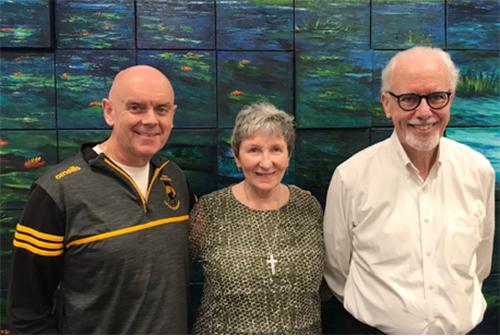
Anthony Mullen, Director of Berry Place, with Sr. Kathleen and Br. Kevin at the conclusion of the 2-day event.)
“The Great Work: Meeting Thomas Berry Again for the First Time”
This Retreat was presented by Br. Kevin Cawley, CFC, and Sr. Kathleen Deignan, CND, on Friday & Saturday, December 1 & 2, 2023 at Thomas Berry Place in Queens, New York. Kevin and Kathleen are two of the four founding conveners of the Thomas Berry Forum for Ecological Dialogue at Iona University who for over fourteen years have fostered an open and inclusive space for ecological education, exploration, and transformation. They share a deep enthusiasm for the penetrating vision and challenge of Thomas Berry and offer ways to embody and practice his ecozoic mode of engaged spirituality and life-ways.
“The Great Work now, in a new millennium, is to carry out the transition from a period of human devastation of the Earth to a period when humans would be present to the planet in a mutually beneficial manner.” (Thomas Berry, “The Great Work,” in The Great Work, p. 3) Kevin and Kathleen welcomed a dozen participants to the weekend for , “ exploring the critical and sacred evolutionary challenge of our time: to continue our movement into an awakened capacity for intimacy, communion, compassion, and solidarity, with the living world.” In light of Thomas Berry’s ever deepening wisdom, we opened his teaching in several directions to meet this new moment in care for our common home.
Much of our time was given to linking the teaching of Thomas to the present global struggles for the best ways to prevent further damage to the planet from the unrestricted burning of fossil fuels. We examined in some detail two recent teachings of Pope Francis – Laudato Si and Laudate Deum – which carry a more and more urgent message to all peoples to re-set the human-earth relationship to a mutually beneficial order. Modes of presentation included videos, powerpoint, direct instruction and small group discussion.
Sessions included prayer and liturgical dance. Special mention was made of the efforts ongoing at the United Nations “ Conference of the Parties “in Dubai struggling for consensus on a way forward to escape the climate crisis. Science, diplomacy, theology, civil society, inequalities, faith engagement, subsidized damaging industries, political dysfunction, global disparities on water resources, and related matters all received some attention as we attempted to better understand our current predicament. (Photo shows Anthony Mullen, Director of Berry Place, with Sr. Kathleen and Br. Kevin at the conclusion of the 2-day event.)
Prayer Vigil Following Outbreak of Hostilities in the Holy Land
The Deignan Institute for Earth and Spirit was represented at the Prayer Vigil on November 15 on the New Rochelle campus. We joined Iona University faculty, staff and students who formed a small gathering under the Ginkgo Tree that afternoon to recall the lives lost since the attack on Israel by Hamas militants on October 7.
Prayers were offered by several speakers on behalf of those killed, missing and injured. Representatives from Religious Studies, Psychology, Social Work , Mission and Ministry and others, offered reflections. Presenters recalled the suffering of families grieving the loss of loved ones. Invocations included:
May the One of Possibility remind us that a future of peace with justice is possible. The prayers concluded with these invocations.
May the One Who Awakens Us to Life hold us in our pain and vindictiveness until we set those down for the sake of life
May the One Who Endures allow us to act for the sake of the coming generations.
May the One Who is Without Limit expand our senses of what is possible as we reach for justice, freedom and peace for us all.
May the One Who Knows Life is Precious help us to affirm life is precious.
May the One Who Grants Peace, Goodness, Blessing, Grace, Lovingkindness, and Mercy grant them now no matter how undeserving we are. (Alissa Wise)
Br. Kevin Cawley of Deignan Institute Delivers Environment and Human Rights Training for Edmund Rice International at UN Geneva Center
On November 9 , Kevin, via online linkage, addressed 12 participants and several staff gathered in Gaillard, France (near Geneva), assembled for the Edmund Rice International Human Rights and Advocacy Training Course.
Participants from Kenya, Australia, India, Zimbabwe, South Africa, Zambia and Argentina took part in the training over a 12-day cycle.
Students had spent several days immersing themselves in the mechanisms at the United Nations, Human Rights study, and days observing Universal Periodic Review sessions, Treaty Body sessions. These activities included engaging with UN bodies and related civil society organizations. The Brothers on staff at the Geneva site link to Kevin in New York for special emphasis on how the advocacy work at the United Nations must necessarily include training in the complexities of the environmental challenges arising globally. Kevin periodically delivers a 90 minute session on current realities in how ERI is advocating for the common good most recently through efforts inspired by Catholic social teaching in the ecological writings of Pope Francis.
Kevin maintains a website, publishes a monthly newsletter, studies current research, and engages colleagues at the United Nations in New York on a wide range of current thinking around how to address the climate crisis. His offering on November 9 focused on means of understanding how to advocate for solutions in light of the recent teaching of Pope Francis in Laudato Si and Laudate Deum, both documents raising alarm about our human predicament and the needed remedies.
This particular training took place in the shadow of COP 28, the Conference of the Parties for the UN Framework Convention on Climate Change. These “COPS,” as they are known, comprise annualgatherings of government authorities, scientists and thought leaders to discuss and sometimes decide, next steps in addressing the global climate crisis. The current meeting, COP28, takes place in Dubai, United Arab Emirates.
Kevin led the group through a rapid summary of recent climate science regarding carbon and atmospheric warming due to the burning of fossil fuels, the water crisis, the temperature crisis, the crashing of planetary boundaries, ocean heat, glacier loss, sea level rise, wildfires, drought, floods, more severe storms, waste, increase in tropical diseases, fossil fuel industry disinformation, global banking hypocrisy, self-defeating government subsidies of fossil fuels, Pope Francis challenging governments, civil society protests, climate conference failures, recent calls by global Faith leaders, the inspiring efforts of young global advocates, and persistent global inequalities. Kevin concluded with the teachings of Thomas Berry, who for many years warned of the necessity to re-set the human-earth relationship to a mutually beneficial standard.
The 90-minute session was divided into three units to allow for spirited exchange of views that exposed clearly differing perspectives between global south and global north. Iona University and Edmund Rice International are able to bridge this gap on a regular basis through work at the United Nations.
Participants: Shawn Viegas cfc (India), Kachi Adindu (VIVAT International), Nablebna Nyagbire (Presentation Brs, Ghana), Eunan McMullan OFM (FI Geneva), Neha Arora (India), Esther Wangui (Kenya), Tino D'Abreu (ERI), Mardamon Slong (India), Brian Bond (ERI), Millicent Kavenagh (Australia), Terry Dowling (ERI), Namatirayi Ngwasha (Trocaire Zimbabwe), Sherelle Myburgh (Sth Africa), Joaquín Vilar del Valle Halty (Argentina), Kashokela Chibanje cfc (Zambia)
Photo: Tino D’ Abreu, CFC
Voices of Vision and Hope
Redemptorists of the Baltimore Province
Washington, DC
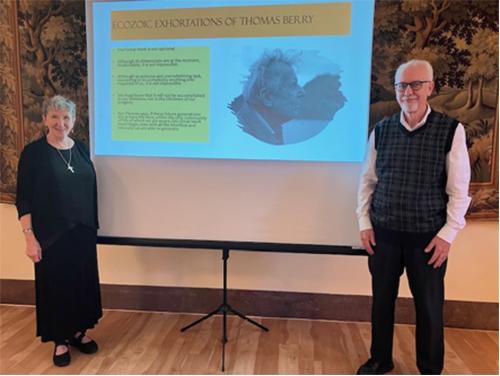
Sr. Kathleen and Br. Kevin following the presentation at Redemptorists Center (Photo: Francis Gargani)
Sr. Kathleen Deignan, CND, and Br. Kevin Cawley, CFC, of the Deignan Institute for Earth and Spirit and the Thomas Berry Forum for Ecological Dialogue at Iona University offered “Voices of Vision and Hope” to an audience assembled at the Redemptorist Center on Saturday October 7, 2023. Fr. Francis Gargani, C.Ss.R, hosted the program and introduced the presenters to 24 participants on site and 30 online viewers via livestream. Sr. Kathleen and Br. Kevin delivered a morning of inquiry and dialogue on the state of our planet, offering global perspectives informed by United Nations initiatives, possibilities for engagement inspired by the Laudato Si’ Action Platform. A significant portion of time was given to opening the wisdom of geologian Thomas Berry and his legacy of an empowering ecological spirituality.
Kevin opened with a review of our planetary predicament, based on United Nations reporting on the science and economics of the climate crisis globally. Reports on the climate change impact of sea level rise, increasing threats from drought, flooding , climate induced migration and severe weather were recounted. Kevin stressed the basic threat of the burning of fossil fuels despite the UN Convention on Climate Change calling for an end to these practices. The UN Framework Convention on Climate Change agreement in Paris in 2015 made commitments to keep global warming under 1.5 C at the insistence of many small island states who are at risk of inundation from rising seas due to melting polar ice and warming oceans. The 1.5 C goal is now in jeopardy.
The audience heard updates on the efforts of Pope Francis to sound the alarm once more following his comprehensive encyclical Laudato Si: On Care For Our Common Home which preceded the Paris conference in 2015. Pope Francis has confirmed and strengthened this message with his apostolic exhortation Laudate Deum on October 4 of this year. He released Laudate Deum just ahead of the United Nations Conference of the Parties 28th Meeting (COP28) in November in Dubai. Laudate Deum is ever more forceful and direct, calling out the wealthier nations for their excessive output of carbon dioxide at the expense of poorer nations doing far less burning of fossil fuels.
Kathleen moved the presentation with a deep appreciation of the work of Thomas Berry who spent his life calling for the “ reinvention of the human at the species level” in order to restore the balance of Earth and its natural forces. Kathleen reminded all - we must enter into deeper understanding of Earth. We must comprehend Earth not as an object of some human dream but also its inherent powers in bringing forth this marvelous display of beauty in such unending profusion. The central challenge for us - the Great Work - is to awaken to the exceptional crisis and possibility that confronts the whole human community in this era of the Anthropocene. Kathleen asks: How does Thomas, our spiritual guide to a new ecological sensibility so direct us? First, he would have us recognize and begin to reverse the conditioning that has thickened and dulled our cosmic sensibilities so we might begin to rehabilitate them. He would have us be aware that we have been shut down by an industrial way of life that has come to determine our conditioning, even as it has been destroying the planet. Thomas calls this effort “The Great Work” and it is ours now to enter and to carry forward. The formal session closed near 12:30 pm followed by coffee, refreshments and multiple informal exchanges among those present. Livestream was also available to registered participants. (30)
On Thursday, October 5, members of the Iona community gathered at the Ginkgo tree in the Quadrangle to mark the conclusion of the Season of Creation. The gathering simultaneously welcomed the apostolic exhortation of Pope Francis, Laudate Deum, released on October 4 as his latest powerful cry for the world to address climate change at long last and with genuine commitments.
The celebration at Iona began just before 11 a.m. with a small procession rising from Murphy Green bearing an icon of St. Francis by Fr. John Giuliani. Father Vaughn Fayle, OFM, and Br. Kevin Cawley held the icon as they walked in the bright sunshine behind a lone piper up the path to the assembly at the Ginkgo tree. Several classes had assembled to hear presentations from Dr. Christina Andruk who spoke at the 11 a.m. gathering on the significance of caring for the natural world and our important place in these efforts.
The Assembly was then addressed by Sr. Kathleen Deignan who presided as Master of Ceremonies for the day assisted by student Layne McDonald. A large canopy shaded participants in chairs facing the Ginkgo and podium. Speakers included Dr. James Robinson, Br. Kevin Cawley, Sam King of Yale University, Ms. Shakina Silverberg of the Student Government Association, John Gardini of Gaels Go Green, Fr. Vaughn Fayle, OFM, and Fr. Gerard Mulvey, OFM Cap. who assisted in the blessing of the animals.
As remarks concluded, a chorus of bell ringers processed around the Ginkgo in celebration as the assembly joined in the blessing of animals, some present and some virtual via cell phone images. A table at the foot of Cornelia steps provided sign up opportunities for Gaels Go Green and also the location for carrying off a small potted plant for student dorm rooms. A remnant of the crowd moved across North Avenue to the conclusion of the services – a tree planting at the entrance to Murphy Center. The new addition, a Blue Muffin Viburnum , aka Arrowwood, features mid-summer white blossoms, and glossy green leaves followed by pale , blue berries in the fall. Butterflies enjoy these blooms and birds will take the fruit. This native species was secured for planting by Mr. Michael O’Donnell of Facilities who received a blessing from the Assembly. After the ceremony and tree planting, Sam King guided two class sessions, "Religion and the Natural World" and "Story of the Universe" through the cosmic walk ritual. This ritual was originally designed by Sr. Miriam McGillis, founder of Genesis Farm, in order to provide participants with an experiential sense of their place in the unfolding cosmos. Gaels Go Green maintained a presence throughout the ceremony, offering a plant giveaway event, as well as a workshop that enabled students to paint their own recycled canvas bags.
Thank you to all participants and planners for this marking of Iona’s commitment to care for our Common Home, 2023.
Workshop Presenters: Scott Thompson and Kathleen Deignan, CND . This event grew out of the partnership of Mariandale Center and the Deignan Institute for Earth and Spirit at Iona University.
Sr. Kathleen and Scott presented their program at Mariandale Retreat Center in Ossining NY on Sunday, September 17. Thirty participants formed the group and remained enthusiastic and engaged during the full day of activities . Several participants shared their backgrounds in care of Earth engagements - in community supported agriculture, middle school education, delivering occupational therapy and teaching in higher education. Small group sharing and large group prayer accompanied the therapeutic intervention of guided meditation. The opening reflection for the day began with an examination of the wisdom of Thomas Berry, particularly this fundamental observation: "Of our many identities, our cosmological identity is a natural fact. Learning to become this identity is the primary purpose of living." Kathleen and Scott shared the facilitation for the day, moving the group gracefully in the various exercises and reflection periods. Ample time was allotted for moving outside and engaging the natural world of the Mariandale setting high above the Hudson. Fr. Vaughn Fayle, O.F.M. and Br. Kevin Cawley accompanied Sr. Kathleen as members of the Deignan Institute for Earth and Spirit. Dr. James Robinson of the Institute led the Iona delegation to the Climate March in New York City.
We were especially graced by the presence of Sister Jeane Clarke, O.P. Sr. Jeane is a peace activist whose protests at the Pentagon and nonviolent resistance to the Trident nuclear submarine sometimes led to jail time. She is the founder of Homecoming Farm and was a Pax Christi Long Island Peacemaker of the Year. Her book was published in March of this year by Orbis: All the Way In: A Story of Activism, Incarceration, and Organic Farming.
Geologian and Ecozoic Visionary Thomas Berry has said that the Great Work of our time is to “reinvent the human” beyond the arrestment of our current technological contractions and personal identity constructions. Our existence – and that of Earth - depends on our willingness to become the Greater Self – the cosmic self. This workshop was an exploration of ways to recover "the cosmic self" through guided embodied practices of discovery to cultivate Earth intimacy.
The day concluded with participants forming a large standing circle in the courtyard of the Center. Here we shared the day’s learnings by proclaiming aloud the insights and the gratitude that each uncovered during the work of connecting to the intimate linkages we all share with our local place in the Cosmos: Earth.
Kathleen also linked us in solidarity to events taking place simultaneously in NYC and elsewhere - the global climate march. Over 75,000 people took to the streets of New York City at the March to End Fossil Fuels, calling on President Joe Biden to stop approving fossil fuel projects, phase down oil and gas drilling, declare a climate emergency, and provide a just and equitable transition off fossil fuels. This was the largest demonstration pressuring Biden since he took office and the largest climate mobilization since the start of the pandemic. It follows more than 700 other #EndFossilFuels actions in 65 countries, with 600,000 people joining over this weekend, with more on the way.
2022 News & Events
The Office of Mission & Ministry, the Religious Studies Department and the Deignan Institute for Earth and Spirit hosted Dr. Mary Evelyn Tucker on Tuesday afternoon September 27 in Burke Lounge for her lecture: “The Call of the Great Work for the Earth Community.”
Mary Evelyn Tucker (Photo: Yale University) is a Senior Lecturer and Research Scholar at Yale University where she has appointments in the School of the Environment as well as the Divinity School and the Department of Religious Studies. She teaches in the joint MA program in religion and ecology and directs the Yale Forum on Religion and Ecology with her husband, John Grim. Dr. Tucker has been working with Iona University Faculty, Students and the Deignan Institute during the fall semester as part of her Deignan Visiting Scholar offerings.
Writers such as Monica Hellwig have explored Catholic intellectual tradition in terms of two aspects: the classic treasures to be cherished, studied, and handed on; and the way of doing things that is the outcome of centuries of experience, prayer, action, and critical reflection. This model allows the intellectual community to deal with experience and knowledge in order to acquire true wisdom, live well, and build good societies, laws, and customs. Fundamental to this process is the understanding that faith and reason do not conflict. Rather, the continued pursuit of understanding leads ultimately to wisdom.
In her Lecture, Dr. Tucker, opened reflections on the encyclical of Pope Francis from 2015 - Laudato Si: On Care for Our Common Home.
She began by reminding us that we are marking this week the 60th anniversary of the publication of Silent Spring by Rachel Carson, the book that sounded the first and clearest alarm about the damage humans were doing to the natural world. Dr. Tucker called attention to the state of the planet where 2/3 of the human population lives now in Asia . The deterioration of the environment has resulted in our time in over 90 million persons displaced by climate change impacts. The loss of biodiversity and the immediate threat of climate change are crowding the news and threaten to increase “ecoanxiety” into more and more of the population.
Laudato si (image) begins with the science of our global predicament- how human activity unchecked has led to a terrible loss of the natural diversity of the planet and threatens the future of all life. Francis next shows our legacy in Chapter Two, “The Gospel of Creation”, where the Genesis story reminds us that all creation began as “good”. Next, he digs into the human roots of the environmental crisis and finds our materialism has been leading humans astray in a culture of waste that gives all control to the marketplace. In Chapter Four, “Integral Ecology”, he begins to show a way forward using the language of integral ecology and the principle of the common good and solidarity with the poor. Here Dr. Tucker took a few moments to recall the writing of Teilhard de Chardin and his insight of a “God beyond name and form- as vast as the universe and as warm as the human heart.”
Dr. Tucker is a lifelong student of Thomas Berry whose writings punctuate many conversations on how the planet might be saved from the human mismanagement we now see clearly. Only ecological intimacy can save us. The need is obvious for a spirituality of Earth and one essential remedy is framed as “The Great Work” - the title of Thomas Berry’s foundational thinking for how to go forward. An essential insight: “Earth is a communion of subjects, not a collection of objects.”
Pope Francis extends the message of Laudato si in Chapter 5- “Lines of Approach and Action” where he explores the notion of politics and economy in dialogue. He concludes with a lengthy chapter on “Ecological Education and Spirituality “ which looks at ecological conversion for civic and political love.
Approximately 70 students attended the event and Dr. Tucker mingled graciously with several of these young people as the lecture ended to allow all to move on to their 1 o’clock classes.
- K. Cawley for Deignan Institute web page
DEIGNAN INSTITUTE FOR EARTH AND SPIRIT
THOMAS BERRY FORUM
Statement on USA Supreme Court Ruling on Environmental Protection Agency
“The establishment of a legal framework which can set clear boundaries and ensure the protection of ecosystems has become indispensable before the new power structures based on the techno-economic paradigm overwhelm not only our politics but freedom and justice as well.” Laudato Si #53
The Deignan Institute for Earth and Spirit responds now in the spirit of the teachings of Laudato Si: On Care for Our Common Home, the 2015 Encyclical of Pope Francis, quoted above. The court was asked to consider whether the Environmental Protection Agency has the authority to issue broad, aggressive regulations on climate-warming pollution from power plants that would force many of those plants to close. In a 6-to-3 decision, the justices ruled that the agency has no such authority.
The ruling, in West Virginia v. Environmental Protection Agency, not only limits the authority of the E.P.A., but potentially that of other agencies to enact a broad array of regulations to protect the environment and public health. It was the product of a coordinated, multiyear strategy by Republican attorneys general, conservative legal activists, and their funders to use the judicial system to rewrite environmental law, weakening the executive branch’s ability to tackle global warming.
The case was unusual because it focused on a program that wasn’t even in force: the Clean Power Plan, an Obama-era federal regulation adopted under the Clean Air Act of 1970, which sought to govern greenhouse gas emissions from power plants. After a barrage of lawsuits from Republican states and the coal industry, the Supreme Court put the program on hold in 2016 and it never took effect. The Biden administration tried to have the case dismissed, arguing that there were no E.P.A. regulations in place for the court to consider. That didn’t work and, in the end, the court favored the plaintiffs, a group of Republican attorneys general, who argued that only Congress should have the power to set rules that significantly affect the American economy. The power sector is the second-largest source of emissions in the United States, after transportation. The major concern immediately will be the implications for global efforts to rein in carbon emissions.
The failure of the United States — the largest emitter of greenhouse gases in history — to meet its climate targets would very likely mean the world will not be able to keep global warming at about 1.5 degrees above preindustrial levels. Beyond that threshold, scientists say, the likelihood of catastrophic heat waves, drought, flooding, and widespread extinctions increases significantly. Earth has already heated an average of 1.1 degrees Celsius since the Industrial Revolution. Below we include a portion of the Dissent offered by Justice Kagan.
She notes precedent shows that the EPA has the right to regulate and she used an interesting precedent: tobacco. The tobacco industry used the same strategy as the fossil fuel industry, but the Supreme Court rejected it.
One of the arguments that the majority made in the EPA ruling—or should we say made-up—is the "major questions doctrine" where something of critical importance should be referred back to Congress. Kagan wrote: "Special canons like the 'major questions doctrine' magically appear as get-out-of-text-free cards. Today, one of those broader goals makes itself clear: Prevent agencies from doing important work, even though that is what Congress directed. That anti-administrative-state stance shows up in the majority opinion, and it suffuses the concurrence.”
And it goes against history; the delegation of authority to agencies has been critical. A long excerpt from Kagan again: "Over time, the administrative delegations Congress has made have helped to build a modern Nation. Congress wanted fewer workers killed in industrial accidents. It wanted to prevent plane crashes and reduce the deadliness of car wrecks. It wanted to ensure that consumer products didn’t catch fire. It wanted to stop the routine adulteration of food and improve the safety and efficacy of medications. And it wanted cleaner air and water. If an American could go back in time, she might be astonished by how much progress has occurred in all those areas. It didn’t happen through legislation alone. It happened because Congress gave broad-ranging powers to administrative agencies, and those agencies then filled in—rule by rule by rule—Congress’s policy outlines."
This SCOTUS decision has begun to reverberate across the environmental sustainability community in the USA with disturbing implications for all efforts to curb carbon emissions and meet the Paris Agreement targets in this country. Many Berry Forum colleagues on these issues are distraught at the prospects for any progress now on several climate fronts.
Deignan Institute will continue to monitor the situation and the potential for organized responses incorporating the teachings of Laudato Si. We plan to be more deeply engaged as Catholic climate groups begin to converge on a strategy for responding for the approaching Season of Creation in September.
(This statement above relies on reporting by Manuela Andreoni of the NYT, Lloyd Alter of Tree Hugger, and the Dissent offered by Justice Elena Kagan on the EPA decision) - Br. Kevin Cawley
The Center at Mariandale
Ossining, N.Y.
Sunday, April 24, 2022
The Deignan Institute for Earth and Spirit and the Thomas Berry Forum for Ecological Dialogue at Iona joined an enthusiastic group of teachers and young people on Sunday, April 24 at this Summit gathering. Dr. Carl Procario Foley, Executive Director of the Center, convened the Summit and invited Sr. Kathleen Deignan, Br. Kevin Cawley and Dr. James Robinson of Iona to help plan and participate with the Sisters of St. Dominic and students from St. John’s University, Manhattan College and Iona University.
The Summit invoked the spirit and wisdom of St. Catherine of Siena, a 14th century figure of enormous impact on her world. She was an avid writer and engaged the great figures of her era, confronting them with their failures to behave responsibly in Church matters. She served as inspiration for those engaged in Care of Earth in our time. The Summit called us toward education and advocacy.
Dr. Erin Lothes Biviano, theologian at St. Elizabeth University in Morristown, NJ, addressed the group in the keynote portion of our day. Erin is a consultant to the global Laudato Si Action Platform. Her most recent book has the title, The Paradox of Christian Sacrifice and she is now Senior Program Manager for Laudato Si Global Animators. Erin is an expert in energy issues from the perspective of Catholic social teaching. She points us to the See, Judge, Act paradigm that we are wise to take on to help us to move against the wrongs of our age that threaten our Earth. She showed us the current models of the warming paths that science has identified and reminded her audience that the world needs to move to 50-75% renewable energy before 2050 to keep global temperature below a 2-degree Celsius rise in temperature.
The most effective “Action” may well be the divestment movement. We need to force the financial industry to end the subsidizing of fossil fuel extraction. The presentation concluded with several examples of Hope in the face of the many challenges of climate change - young people stepping up with great clarity to push back at the status quo, others challenging government practices such as auction of public lands to extractive industries, young people staging hunger strikes in DC, and others engaged in contact with local officials. Actions will also include participation in the Laudato Si Action Platform. Erin invited the young people to become involved as Laudato Si Animators by way of the online training now available.
The Summit concluded with small group exchanges and a very engaged discussion of future partnerships and actions on behalf of the Laudato Si Action Platform.
Members of the Iona community gathered in the Sustainability Gardens with Edgar Hayes, co-founder of Freedom Farm Community in Middletown, NY. Those who gathered included professors, students, and staff from the Religious Studies Department, the Biology Department, and Campus Ministry. Also in attendance was Fr. Enzo Del Brocco, vice-provincial of the Passionist order. Edgar led those gathered through a reflection on how far our food typically travels (and how many steps it passes through) to get from seed to plate. He additionally led those gathered to reflect on the link between systemic racism and food deserts (by looking at the history of redlining). Edgar’s presentation included a display of seeds, compost, and soil from Freedom Farm. The event was sponsored by the Deignan Institute for Earth and Spirit.
Members of the Iona community gathered in the Sustainability Gardens with Sean Gargamelli-McCreight, co-founder of Benincasa Community in Guilford, CT. Those who gathered included professors, students, and staff from the Religious Studies Department, the Biology Department, and Campus Ministry. Sean led those present through the Cosmic Walk, a contemplative ritual inspired by the work of Fr. Thomas Berry and created by Sr. Miriam MacGillis, OP of Genesis Farm. The ritual invited those present to prayerfully enter into the universe's 13.8-billion-year journey, from the Big Bang into the present moment. Through the ritual, and during a group reflection after, we considered the spiritual, social, and environmental implications of acknowledging our deep connection to the evolving cosmos. The event was sponsored by the Deignan Institute for Earth and Spirit.
Tuesday, April 5, 2022 at 1 p.m.
Romita Auditorium of Ryan Library
Host today is Dr. Christina Carlson, Associate Professor of English
The speakers: Dr. Richard Newkirk and filmmaker Claudia Stack
Sharecrop showcases the experience of ten individuals who were involved in sharecropping during the segregation era. Featuring oral history and period images, the film conveys stories from cotton sharecroppers in the Mississippi Delta, tobacco sharecroppers in the Carolinas, and others. It explores their lives, the way they worked and celebrates the resilience of the South's forgotten farmers.
Sometimes called “the forgotten farmers,” sharecroppers were vital to agricultural production prior to widespread farm mechanization. Featuring rare archival footage and many period images, the film conveys what life was really like for cotton sharecroppers in the Mississippi Delta, tobacco sharecroppers in the Carolinas, and others. Sharecrop explores their lives, the way they worked, and illuminates connections to civil rights, the wealth gap, and African American land loss.
Dr. C. Sade Turnipseed, Professor of History at Mississippi Valley State University and head of the Cotton Pickers of American Historic Monument project, said Sharecrop is one of only a few documentaries that effectively captures the authentic contemporary voice of sharecroppers."
Sharecrop was featured at the 2018 National Council for Black Studies Conference and has screened at many other conferences and film festivals.
Sharecrop is a vivid, sorrowful account of the experience of African American sharecrop farmers in the rural South of the USA. The practice of sharecropping prevailed in the region from 1868 until the 1930s and later in many regions. The practice amounted to indentured debt peonage because the owner of the land regularly denied the black worker full value for the work. The 500 pounds of cotton somehow never was sufficient to allow the worker to be free of debt. No black person was able to escape the vicious cycle of debt as a result. Few blacks had access to schooling at this time. All available labor was required for the cotton fields. Or tobacco farms.
The only education virtually was the local Church which was a refuge for the black families one day per week. Oppression of black people held all in fear even from the black overseer of the plantation. White sharecroppers also suffered from poverty but escaped the random deadly violence inflicted on the black families who had no recourse to the justice system at the time.
Viewers were treated to a deeply revealing and tender account from a series of narrators who share the story of their family struggles to break the chains of modern serfdom.
“Women, Work, and Reform in the Global Garment Industry”
A Presentation of the Deignan Institute for Earth and Spirit and the Thomas Berry Forum for Ecological Dialogue
March 22, 2022
Live and Online in the classroom of Dr. Christina Carlson, Associate Professor of English:
ENG 352 Shifting Selves: “Disney Princess Culture”
The global garment industry plays a direct role in the lives of all people. Every day, we get dressed— yet how often do we think about the conditions under which our favorites clothes are made? Or who makes our outfits?
Iona Alumna Céire Kealty explores the state of the global garment industry, with commentary on labor and environmental exploitations inherent to the industry. She centers on women, who overwhelmingly dominate the industry, and whose voices play a critical role in enacting reform.
Céire reveals important details the fruits of (women) garment workers’ labor — not only clothes sewn within the factory, but the unions fashioned secretly among laborers, their protests and collaboration with lawmakers and journalists in Bangladesh, the United States, and other countries.
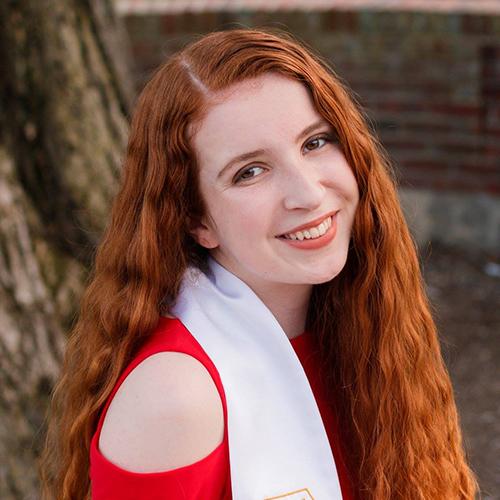
Our Speaker: Céire Kealty
Céire Kealty is a doctoral student in the Department of Theology and Religious Studies at Villanova University, studying Christian ethics and spirituality. She writes about the global garment industry, workers' rights, and clothing in religious and "secular" spaces. Céire is a regular contributor to the National Catholic Reporter’s “Earth Beat” column, and her essays and articles have also appeared in Sojourners and a number of other journals.
In this video Sr. Kathleen Deignan delivers the Homily at Mass at the Benedictine Grange for the Second Sunday of Lent 2021. Sr. Kathleen opens these challenging texts, reveals her insights into their possible meanings, and uncovers their message for us in our present time.
The Readings are from Genesis Chapter 22: verses 1-2, 9-13, 15-18 and the Gospel of Mark Chapter 9: verses 2-10.
The Genesis reading recounts the great test of Abraham when God commands him to bind his son Isaac and bring him to the place of sacrifice. Abraham assented to God’s will and began the journey. As he was about to slay Isaac, the messenger called to him from Heaven, “Do not lay your hand on the boy.” Abraham’s faith was thus rewarded. Generations of believers continue to ponder the implications of God’s testing of Abraham.
In Mark’s Gospel account we see Jesus transfigured on the mountain in the presence of Peter, James and John.
February 10, 2021
Sr. Kathleen Deignan, CND, in Conversation with Father James Martin of the Society of Jesus
Nearly 200 participants joined the online event for the conversation on Wednesday evening February 10, 2021 as Fr. James Martin and Sister Kathleen Deignan engaged in a lively exchange on the occasion of the release of Fr. Martin’s most recent book, How to Pray: A Guide for Everyone.
Fr. Martin and Sr. Kathleen are longtime friends who have a common spiritual heritage around Thomas Merton and share a deep conviction that everyone has an inner life that calls for nourishment. Both have been prominent teachers of spiritual practice and many former students were part of the audience on Wednesday.
We were surprised to learn that Fr. Martin was a graduate of the Wharton School of Business and had spent several years in the corporate world before responding to the call to religious life.
The conversation ranged over Ignatian spirituality for the most part due to the Jesuit training of Fr. Martin and Sr. Kathleen reported her own exposure to the tradition by way of Fr. George Aschenbrenner, S.J. a noted and much beloved Jesuit spiritual teacher. The Jesuit spirit of “being present to the culture” animates much of Fr. Martin’s work. For example , his writings include a recent text, Building a Bridge: How the Catholic Church and the LGBT Community Can Enter into a Relationship of Respect, Compassion and Sensitivity. This book led to a personal audience with Pope Francis not long ago after various bishops invited Fr. Martin to a World Meeting of Families. Fr. Martin reports the time one-on-one with Pope Francis in October 2019 inspired him and has encouraged him in his ministry of outreach to the LGBTQ community. The two Jesuits share a pastoral approach that stresses compassion and accompaniment rather than condemnation and exclusion.
Sr. Kathleen called us back to the specifics of the book under discussion and Fr. Martin enumerated the various portions: Everyone Can Pray, Kinds of Prayer, Why Pray? Prayer as Friendship, Ways of Praying, What Happens When You Pray? , etc. We stay faithful and stay on the path to keep learning what is God’s voice in prayer and what is not God’s voice. In Fr. Martin’s telling, ultimately God’s mercy is more than we can imagine; God is all forgiveness, all compassion.
For Fr. Martin, the Jesus story remains the essential driver of his own reaching out to people. Jesus always met people where they were and spoke to them in direct language that met their known experience; recall he was a carpenter calling fishermen! One lesson here - go where the people are and speak their language.
Sometimes prayer can motivate us. God raises up things for us to notice and these feelings are God’s way of moving us toward help. How else would God move us? God’s desires are fulfilled by raising up desires in us. We can recall the teaching of “lectio divina” or spiritual reading and reflection on the scripture but other times, the modalities can be quite ordinary, such as reading the daily newspaper and becoming aware of a need or noticing an injustice calling us to action.
Some of us find it a challenge to be present to those in desolation; we feel so inadequate in the face of immense sadness, but we can - in the words of Sr. Kathleen- “wrap our arms around our friend and hold them in their sadness while imagining the mercy of God surrounding all in its infinite embrace beyond human comprehension, beyond any human capacity, wrapped in infinite mercy and embraced by the creator of all mercy.”
For all of us we do well to remember that always the voice of God is the voice of Hope.




